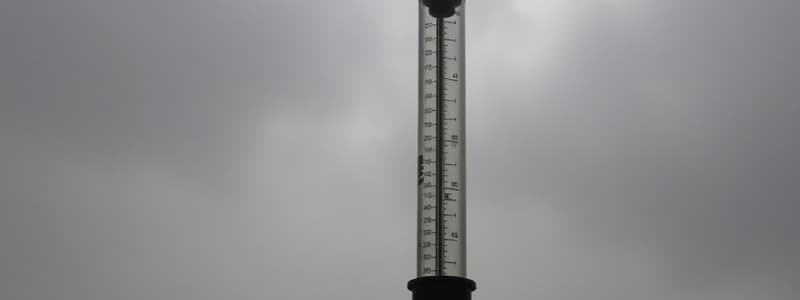Podcast
Questions and Answers
What is the primary driver of atmospheric circulation?
What is the primary driver of atmospheric circulation?
- The Coriolis effect caused by Earth's rotation.
- Variations in the Earth's magnetic field. (correct)
- Gravitational forces exerted by the moon.
- Unequal heating of the Earth's surface by the sun.
If an aircraft climbs from sea level to 3,000 feet, what approximate changes in atmospheric pressure and temperature should the pilot expect?
If an aircraft climbs from sea level to 3,000 feet, what approximate changes in atmospheric pressure and temperature should the pilot expect?
- Pressure decreases by 3 inches of mercury, temperature decreases by 10.5 degrees Fahrenheit. (correct)
- Pressure increases by 3 inches of mercury, temperature increases by 10.5 degrees Fahrenheit.
- Pressure decreases by 1 inch of mercury, temperature decreases by 2 degrees Fahrenheit.
- Pressure increases by 1 inch of mercury, temperature increases by 2 degrees Fahrenheit.
What condition is indicated by a small or converging temperature/dewpoint spread?
What condition is indicated by a small or converging temperature/dewpoint spread?
- High winds and turbulence.
- Icing conditions at higher altitudes.
- Clear skies and stable air. (correct)
- Fog and low clouds.
Which of the following processes adds moisture to unsaturated air?
Which of the following processes adds moisture to unsaturated air?
How does atmospheric pressure typically change as a front approaches and passes?
How does atmospheric pressure typically change as a front approaches and passes?
What are the three primary conditions required for thunderstorm formation?
What are the three primary conditions required for thunderstorm formation?
Which type of front is most often associated with thunderstorms and squall lines?
Which type of front is most often associated with thunderstorms and squall lines?
What makes a microburst particularly dangerous for aviation?
What makes a microburst particularly dangerous for aviation?
According to regulations, under what condition can a pilot fly into known icing conditions?
According to regulations, under what condition can a pilot fly into known icing conditions?
According to FAR 61.56, what is the requirement for a flight review?
According to FAR 61.56, what is the requirement for a flight review?
To act as pilot in command carrying passengers at night, what recent experience is required, according to regulations?
To act as pilot in command carrying passengers at night, what recent experience is required, according to regulations?
According to FAR 1.1, how is night defined?
According to FAR 1.1, how is night defined?
According to FAR 91.103, what preflight action must each PIC take before beginning a flight?
According to FAR 91.103, what preflight action must each PIC take before beginning a flight?
What does the acronym 'ARROW' represent in the context of required aircraft documents and equipment?
What does the acronym 'ARROW' represent in the context of required aircraft documents and equipment?
According To FAR 91.303 under what condition is aerobatic flight prohibited?
According To FAR 91.303 under what condition is aerobatic flight prohibited?
According to FAR 91.205, what equipment is required for Day VFR flight, represented by 'A TOMATO FLAMES'?
According to FAR 91.205, what equipment is required for Day VFR flight, represented by 'A TOMATO FLAMES'?
What additional equipment is required for Night VFR flight, beyond what is required for Day VFR, as indicated by 'FLAPS'?
What additional equipment is required for Night VFR flight, beyond what is required for Day VFR, as indicated by 'FLAPS'?
According to FAR 91.3, what authority does the pilot in command (PIC) have?
According to FAR 91.3, what authority does the pilot in command (PIC) have?
According to NTSB Part 830, under what circumstance is immediate notification to the NTSB required?
According to NTSB Part 830, under what circumstance is immediate notification to the NTSB required?
What information can a pilot obtain from a Surface Analysis Chart?
What information can a pilot obtain from a Surface Analysis Chart?
Flashcards
Unequal Solar Heating
Unequal Solar Heating
The primary force driving atmospheric circulation, caused by the sun's uneven heating of the Earth.
Atmospheric Pressure
Atmospheric Pressure
The altitude is inversely proportional to this measure; it decreases as you gain altitude.
Temperature Lapse Rate
Temperature Lapse Rate
The temperature change for every 1,000 feet gained in altitude in the atmosphere.
Temperature/Dewpoint Spread
Temperature/Dewpoint Spread
Signup and view all the flashcards
Evaporation and Sublimation
Evaporation and Sublimation
Signup and view all the flashcards
Condensation
Condensation
Signup and view all the flashcards
Sublimation
Sublimation
Signup and view all the flashcards
Frontal Passage Signs
Frontal Passage Signs
Signup and view all the flashcards
Thunderstorm Formation Conditions
Thunderstorm Formation Conditions
Signup and view all the flashcards
Wind Shear
Wind Shear
Signup and view all the flashcards
Microburst
Microburst
Signup and view all the flashcards
Icing Flight Restrictions
Icing Flight Restrictions
Signup and view all the flashcards
Night Currency Requirement
Night Currency Requirement
Signup and view all the flashcards
NWKRAFT
NWKRAFT
Signup and view all the flashcards
ARROW
ARROW
Signup and view all the flashcards
Aerobatic Flight Restrictions
Aerobatic Flight Restrictions
Signup and view all the flashcards
A TOMATO FLAMES
A TOMATO FLAMES
Signup and view all the flashcards
ATC Clearance Exception
ATC Clearance Exception
Signup and view all the flashcards
Aircraft Accident Definition
Aircraft Accident Definition
Signup and view all the flashcards
METAR
METAR
Signup and view all the flashcards
Study Notes
- Atmospheric circulation relies on unequal heating from the sun
- Every weather process involves or results from heat exchange
Atmospheric Pressure
- Atmospheric pressure decreases with elevation
- It decreases 1 inch of mercury per 1,000 feet of elevation gain
- Temperature decreases about 2 degrees Celsius (3.5 degrees Fahrenheit) per 1,000 feet increase in elevation
Humidity and Dew Point
- A small or converging temperature/dewpoint spread can lead to fog and low clouds
Moisture in the Air
- Unsaturated air has a relative humidity below 100%
- Saturated air has a relative humidity at 100%
Processes Adding Moisture to Unsaturated Air:
- Evaporation: liquid to water vapor
- Sublimation: ice to water vapor
Frontal Systems
- Pressure typically falls as a front approaches and rises after it passes
- Winds shift to the right after a frontal passage
Thunderstorm Formation
- Avoid thunderstorms by at least 20 nautical miles
- Three conditions must exist:
- Unstable air (warmer air parcels)
- Lifting action (fronts, terrain, solar heating)
- High moisture levels
- LIM: Lift, Instability, Moisture
- Thunderstorms and squall lines often form ahead of fast-moving cold fronts.
Thunderstorm Types
- Single Cell: Lasts less than 1 hour
- Multi Cell: Cluster of storms in different development stages
- Squall Line: Forms 50-100 miles ahead of fast-moving cold front
Wind Shear
- Wind shear is a change in wind speed or direction over a short distance
- Microbursts are dangerous downdrafts linked to convective activity
Icing Conditions
- Pilots cannot fly into known icing without anti-icing/deicing equipment, according to regulations
Flight Review (FAR 61.56 and 61.57)
- A pilot must receive a flight review within the preceding 24 calendar months to act as PIC
- To carry passengers during the DAY, the pilot must have completed 3 takeoffs and landings in the same category and class of aircraft within the preceding 90 days
- To carry passengers at NIGHT (1 hour after sunset and 1 hour before sunrise), the pilot must have completed 3 takeoffs and landings to a full stop during night hours within the preceding 90 days
Aircraft Category and Class
- Example: Category - Airplane, Class - Single Engine Land (SEL)
Night Definition (FAR 1.1)
- Night is the time between the end of evening civil twilight and the beginning of morning civil twilight
Aircraft Lighting (FAR 91.209)
- Position and anti-collision lights must be on from sunset to sunrise
Intoxicated or Drugged Passengers (FAR 91.17)
- Pilots cannot allow intoxicated or drugged persons on board except in emergencies
Preflight Action (FAR 91.103)
- The Pilot in Command (PIC) must be familiar with all available information before the flight.
NWKRAFT (Preflight Information)
- NOTAMS
- Weather
- Known ATC delays
- Runway lengths
- Alternates
- Fuel requirements
- Takeoff/landing distances
Required Aircraft Documents (FAR 91.203, ARROW)
- A - Airworthiness Certificate
- R - Registration Certificate (must not be expired)
- R - Restricted Radiotelephone Operator's Permit (only required for international flights)
- O - Operating Limitations (found in POH)
- W - Weight and Balance information
Aerobatic Flight Restrictions (FAR 91.303)
- Over congested areas
- Over open-air assemblies of people
- Within Class B, C, D, or E airspace
- Within 4 NM of a Federal airway centerline
- Below 1,500 feet above the surface
- When flight visibility is less than 3 statute miles
Required Day VFR Equipment (FAR 91.205, "A TOMATO FLAMES")
- A - Airspeed Indicator
- T - Tachometer (each engine)
- O - Oil Pressure Gauge (each engine)
- M - Manifold Pressure Gauge (altitude engines)
- A - Altimeter
- T - Temperature Gauge (liquid-cooled engines)
- O - Oil Temperature Gauge (air-cooled engines)
- F - Fuel Gauge (each tank)
- L - Landing Gear Position Indicator (if applicable)
- A - Anti-Collision Lights (red/white)
- M - Magnetic Compass (with deviation card)
- E - Emergency Locator Transmitter (ELT)
- S - Safety Belts (for all passengers > 2 years old)
Required Night VFR Equipment (FAR 91.205, "A TOMATO FLAMES + FLAPS")
- F - Fuses (spare set)
- L - Landing Light
- A - Anti-Collision Lights
- P - Position Lights
- S - Source of Electrical Power (battery or alternator)
- Plus Day VFR Equipment "A TOMATO FLAMES"
Passenger Briefing (FAR 91.107)
- PIC must brief passengers on how to fasten/unfasten seatbelts and shoulder harnesses
PIC Authority and Responsibility (FAR 91.3)
- PIC has final authority over the flight and aircraft
- PIC may deviate from FARs in an emergency
ATC Instructions and Clearances (FAR 91.123)
- Pilots cannot deviate from ATC clearances without an amended clearance or an emergency
- If an ATC clearance violates an FAR, disregard it and notify ATC
NTSB Part 830: Reporting Aircraft Accidents and Incidents
- Accident: death or serious injury, or substantial damage to the aircraft
- Incident: any occurrence affecting or potentially affecting safety of operations
NTSB Notification Requirements
- Flight control system malfunction or failure
- In-flight fire
- Aircraft collision in flight
- Damage > $25,000 to property other than the aircraft
- Release of a propeller blade (except from a ground strike)
METAR (Meteorological Aerodrome Report)
- Also known as Aviation Routine Weather Report
- Observation, not a forecast
- Valid within 5 NM of an airport
- Issued hourly, valid for 1 hour, or until the next METAR
- Special METAR (SPECI) issued when significant weather changes occur
- Use AWC METAR/TAF websites
Reading a METAR
- Sequence: station identifier, date/time, wind, visibility, precipitation, cloud cover, temperature/dewpoint, altimeter setting, remarks
Surface Analysis Chart
- Displays location of fronts and pressure systems
- U.S. low-level significant weather prog chart is valid up to 24,000 feet.
Flight Service Station (FSS)
- Frequency 122.2
- Primary source for preflight weather information
- Call 1-800-WX-BRIEF or go to 1800wxbrief.com to file VFR or IFR flight plans and obtain weather briefings
Types of Weather Briefings
- Outlook Briefings are for departures 6 or more hours away
Data Link Weather
- Often included with GPS and EFB cockpit or tablet display systems
Studying That Suits You
Use AI to generate personalized quizzes and flashcards to suit your learning preferences.
Description
Explores how the atmospheric circulation relies on unequal heating from the sun. Also describes atmospheric pressure, humidity, dew point, frontal systems, and thunderstorm formation. It provides essential insights into weather processes and safety measures.




